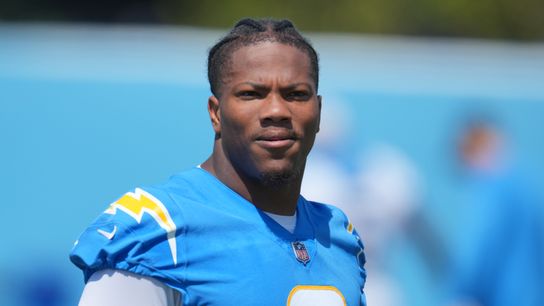EL SEGUNDO, Calif. -- Surviving and growing up in South Central Los Angeles requires a unique and delicate blend of awareness, grit, brilliance and boldness. It is a place where the lives of countless young people are cut down like blades of grass by the ills that have come to define the community––violence and drugs.
But amidst the grim realities, brilliance often emerges, resolved and determined. Los Angeles Chargers linebacker Daiyan Henley's unwavering determination, jovial spirit, and resilience are shining examples. Radiating a rare blend of toughness and talent, Henley's presence in the NFL is a testament to the indomitable spirit that thrives even in the most challenging environments. For the second-year linebacker, the marathon is just beginning.
Henley grew up in the Crenshaw District of Los Angeles, commonly called the 60s, where life isn't sweet; it's built on strength. The bitterness of the harsh realities of Henley's own life helped define him as a man, but even more so, how he plays the game.
Henley credits his evolution and development to the mentorship of linebackers coach NaVorro Bowman. "Coach Bo is like a players' coach, but more than that, he was a dominant player himself," Henley shared. Watching Bowman's film during meetings, Henley sees the kind of player he aspires to be, someone who worked his way up from being a special teams player to a feared All-Pro starter. Bowman's ability to directly relate to Henley's position has been a boon to Henley's development.
The echoes of the Crenshaw District's influence are evident in every tackle and play for Henley. He plays with a chip on his shoulder, not out of anger, but of purpose. For him, being a linebacker isn't just a position—it's a reflection of his life. The middle of the defense is where the action is, decisions are made in split seconds, and leadership is tested. It's the same in the 60s, where every day is a test of survival. It's the choices you make that can define the rest of your life.
"I'm from the inner city, the 'District,' to be exact, and it's not sweet. So the biggest thing for me, being a linebacker, is exactly that. We are in the middle of the defense if I'm correlating it to the defense. We are in the middle of the streets, we are in the middle of the hood, and people are looking at you for the answer. I think that correlates for me because I'm in the middle of this defense, and I have to both be in pass, in run and be dominant in both," Henley said. "I look at my city, and you have to be to withstand the streets and the books."
Henley's journey from the Crenshaw District to the NFL wasn't just escaping the violence or defying the odds; it was carrying the weight of his community on his shoulders. He embodies the duality of his upbringing—tough enough to withstand the chaos of his environment, yet wise enough to have navigated through it with his head held high. In many ways, Henley is still in the middle of it all, but now the stakes are different, the field is more robust, and the impact is far more reaching.
For Henley, football isn't just a game; it's a continuation of the marathon his childhood mentor, Nipsey Hussle, began. He knows complacency is an enemy; if Hussle hadn't been slain in his neighborhood streets, he would have emphasized to Henly.
"Don't be complacent because just looking at his path, his journey, and who he became, you can see that he hit a lot of milestones. He hit a lot of things he wanted to get done before he was taken from us, and he still wanted more, so I think that would definitely be his message to me. Don't get complacent," Henley said.
Football is how Henley represents himself and where he comes from, showing that brilliance emerges from the most unforgiving and unassuming places; it shows that roses grow from concrete.
In the words of the late Hussle, "The marathon continues." For Henley, the marathon is just beginning.
